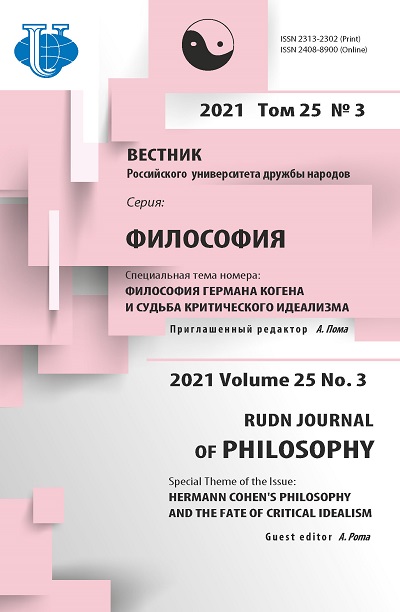Individual and Social in L.I. Petrazhitsky's Philosophy of Law
- Authors: Kornilaev L.Y.1
-
Affiliations:
- Immanuel Kant Baltic Federal University
- Issue: Vol 25, No 3 (2021): HERMANN COHEN'S PHILOSOPHY AND THE FATE OF CRITICAL IDEALISM
- Pages: 513-523
- Section: STUDIES IN HISTORY OF RUSSIAN PHILOSOPHY
- URL: https://journals.rudn.ru/philosophy/article/view/27516
- DOI: https://doi.org/10.22363/2313-2302-2021-25-3-513-523
Cite item
Full Text
Abstract
Along with competing legal concepts of positivism and gnoseologism in the second half of the 19th century, a direction of legal psychology was formed, within which the psychological theory of law by the Russian and Polish lawyer L.I. Petrazhitsky takes a prominent place. L.I. Petrazhitsky's legal theory interprets the law as a mental phenomenon in a person's mind. The mental life forms the internal and external legal behavior. Studying the law becomes possible only by analyzing the subject's particular kind of emotional life - legal experience. Our focus on the individual's emotional world gives us reason to think of the theory as individualistic, i.e., close to the subject's mental life. At the same time, the Russian lawyer's psychological doctrine also gains explanatory potential for scrutinizing social life. It contains ideas that reveal such mechanisms of social functioning as the affirmation of the ideal of love as the ultimate goal of law-making, the priority of unofficial law in the life of society, and a specific interpretation of public and private law. The system of legal emotions is carried out on the social niveau and establishes such values as love and social order. The article reconstructs the main provisions of Petrazhitsky's psychological theory of law from the point of view of the interaction of its individual and social sides. The social potential of the Russian lawyer's theory appears capable of supplementing and explaining the ideas of socialism and sobornost discussed widely at the turn of the 19th and 20th centuries. Petrazhitsky's individualistic doctrine appears as a flexible concept, capable of fitting organically into various philosophical and sociological contexts.
About the authors
Leonid Yu. Kornilaev
Immanuel Kant Baltic Federal University
Author for correspondence.
Email: kornhist@mail.ru
PhD (philosophy), Research Fellow, Academia Kantiana
14, Aleksandra Nevskogo st., Kaliningrad, 236016, Russian FederationReferences
- Belov VN. Neokantianstvo P. I. Novgorodceva: k polemike Novgorodceva i Saval'skogo [P.I. Novgorodtsev’s Neo-Kantianism: Novgorodtsev and Savalskiy Debate]. LEX RUSSICA (Russkij zakon). 2019;147(2):151—162. doi: 10.17803/1729-5920.2019. 147.2.151-162 (In Russian).
- Zagirnyak MYu. Aksiologicheskie aspekty filosofii prava G.D. Gurvicha [Axiological Aspects of the Georges Gurvitch’s Legal Philosophy]. Voprosy Filosofii. 2016;(9): 54—62. (In Russian).
- Zagirnyak MYu. Solidarnost’ kak instrument institualizatsii svobody v filosofii Sergeya Gessena [Solidarity as an Instrument of the Institutionalization of Freedom in Sergius Hessen’s Philosophy]. Vestnik Tomskogo gosudarstvennogo universiteta. Filosofiya. Sotsiologiya. Politologiya — Tomsk State University Journal of Philosophy, Sociology and Political Science. 2019;(47):121—128. doi: 10.17223/1998863Х/47/13 (In Russian).
- Frolova EA. Filosofiya prava v Rossii: neokantianstvo (vtoraya polovina 19 — pervaya polovina 20 veka) [Philosophy of Right in Russa: Neo-Kantianism (the Second Part of 19th and the First Part of 20th Centuries)]. Moscow: Prospect; 2019. (In Russian).
- Wundt W. Problemy psikhologii narodov [Problems in Cultural Psychology]. Transl. by N Samsonov. Moscow; Cosmos; 1912. (In Russian).
- Tard G. Sotsial'naya logika. [Social Logik]. Transl. by M Tseitlin. Saint Petersburg; 1996. (In Russian).
- Zitelmann E. Gewohnheitsrecht und Ittrum. Archiv für die civilistische Praxis. 1883;66:323—468.
- Walicki A. Filosofiya prava russkogo liberalizma [Legal Philosophies of Russian Liberalism]. Moscow: Mysl'; 2012. (In Russian).
- Golovina LYu. L.I. Petrazhitsky's Theory of Understanding of Law: History and Contemporaneity: [dissertation]. Moscow; 2007. (In Russian).
- Ovchinnikova AV. Problems of Legal Genesis and Ontology of Law in L.I. Petrazhitsky's psychological theory: [dissertation]. Saint Petersburg; 2006. (In Russian).
- Merezhko AA. Psikhologicheskaya shkola prava L.I. Petrazhitskogo. Istoki, soderzhanie, vliyanie. [Psychological School of Law of L. I. Petrazhitsky. The Origins, Content, Influence]. Odessa; 2016. (In Russian).
- Petrazhitskii LI. Ocherki filosofii prava. Vyp. 1. Osnovy psikhologicheskoi teorii prava. Obzor i kritika sovremennykh vozzrenii na sushchestvo prava. [Essays on Philosophy of Law. Issue 1. Foundations of Psychological Theory of Law. Review and Criticism of Contemporary Views on the Essence of Law]. Saint Petersburg; 1900 (In Russian).
- Petrazhitskii LI. Vvedenie v izuchenie prava i nravstvennosti: Emotsional'naya psikhologiya [Introduction to the Study of Law and Morality: Emotional Psychology]. Saint Petersburg; 1905. (In Russian).
- Petrazhitskii LI. Teoriya prava i gosudarstva v svyazi s teoriei nravstvennosti [Theory of Law and State in Connection with the Theory of Morality]. Saint Petersburg; 2000. (In Russian).
- Petrazhitskii LI. Vvedenie v nauku politiki prava [Introduction to the Science of Politics and Law]. In: LI Petrazhitskii, Teoriya i politika prava. Izbrannye trudy [Theory and Politics of Law. Selected Works]. Saint Petersburg; 2010. (In Russian).
- Gurvitch G. Filosofiya i sotsiologiya prava: Izbrannye sochineniya. [Philosophy and Sociology of Law: Selected Works]. Saint Petersburg; 2004. (In Russian).
















